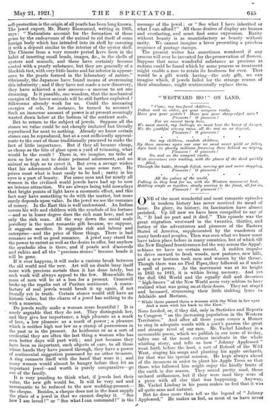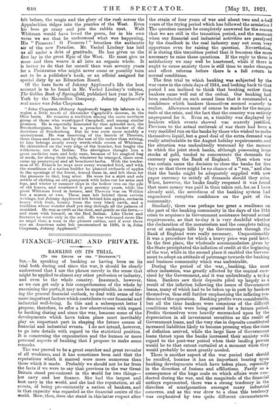" WESTWARD HO ! " ON LAND.
" Come, my tan-faced children, Follow well in order, get your weapons ready, Have you your pistols ? Have you your sharp-edged axes Pioneers ! 0 pioneers !
For we cannot tarry here,
We must march, my darlings, we must bear the brunt of danger, We the youthful aineurg races, all the rest on us depend, Pioneers ! 0 pioneers !
• See my children, resolute children, By those swarms upon our rear we must never yield or falter. Ages back in ghostly millions frowning there behind us urging, Pioneers ! 0 pioneers ! On and on the compact ranks, With accessions ever waiting, with the places; of the dead quickly filled, Through, the battle, through defeat, moving yet and never stopping, Pioneers I 0 pioneers 1 • All the pulses of the world, Falling in they beat for us, with the Western movenaent beat, Holding single or together, steady moving to the front, all for us, Pioneers / 0 pioneers I"
('NE of the most wonderful and most romantic episodes in modern history has never received its mead of fame. Its glory, its history, its fascination have almost perished. Up till now we have been compelled to say of it, " It had no poet and it died." This episode was the great migration westward in the twenties, thirties, and forties of the adventurers and pioneers of the Eastern State; of America, supplemented by the wanderers of many lands and peoples. Then was seen what we know must have taken place before in many countries, but of which till the New England frontiersmen led the way across the Appal- achians we have no certain record. A sudden impuls3 to drive onward to fresh woods, new pastures, new hills, and a new horizon took men and women by the throat. Though there was no Pied Piper,they followed as if under a spell of power. As the movement was at its height in 1835 to 1845, it is within living memory. And yet the dull Old World and the equally dull and decorous " high-brows " of the New World seem very seldom to have realized what was going on at their doors. They sat stupid and bemused, strumming their little tinkling lyres to Adelaide and Mariana,
" While there passed thorn a woman with the West in her eyes And a man with his back to the East."
None heeded, or, if they did, only in Statistics and Reports to Congress " on the increasing population in the Western Territories." And after all these years comes a Homer to sing in adequate words with a poet's passion the great and strange revel of our race. Mr. Vachel Lindsay in a memorable poem, which we publish in our issue of to-day, takes one of the most curious incidents in the whole whirling story, and tells us how " Johnny Appleseed " went forth before the host, a sort of Roland of the Wild West, singing his songs and planting his apple orchards, for that was his special mission. He kept always ahead of the incomers in order to plant his Apple Trees so that those who followed him might enjoy the kindly fruits of the earth in due season. They sound pretty mad, these orchard oriflammes, but if they were mad they were of a piece with all else that was happening. Anyway, Mr. Vachel Lindsay in his poem makes us feel that it was all quite sane and natural. But he does more than tell us the legend of " Johnny Appleseed." He makes us feel, as most of us have never felt before, the magic and the glory of the rush across the Appalachian ridges into the prairies of the West. Even his bees go crazy and join the rabble rout. Walt Whitman would have loved the poem, for in his own verse we see that he understood what was happening. His " Pioneers ! 0 Pioneers I " breathes the authentic air of the new Paradise. Mr. Vachel Lindsay has laid us all under a debt of gratitude. He has given us the first lay in the great Epic of the West. He must give us more and then weave it all into an organic whole. It is better to do that for oneself than wait seventy years for a Pisistratus who might never come or possibly turn out to be a publisher's hack, or an official assigned for special duty by an Education Board.
Of the bare facts of Johnny Appleseed's life the best account is to be found in Mr. Vachel Lindsay's volume, The Golden Book of Springfield, published last year in New York by the Macmillan Company. Johnny Appleseed's real name was John Chapman.
"John Chapman (Johnny Appleseed) began his labours in a region a little notch of Alexander Cippbell's diocese, in the Ohio basin. He remains a tradition among the more northern group of those who worshipped Campbell, and among similar pioneers. He is especially honoured by that splendid sect, the Swedenborgians, for he was a preacher and teacher of the doctrines of Swedenborg. But he was even more notably a nurseryman'. He Was deserving of the laurels of Thoreau, three times and more, and by the test of life rather than writing, to him belongs nearly every worth-while crown of Whitman. He skirmished on the very edge of the frontier, but fought the wilderness, not the Indian. The aborigines thought him a great medicine man and holy man, because of his magical bag of seeds, for along their trails, wherever he tramped, there soon came up pennyroyal and all beneficent herbs. With the tender- ness of St. Francis he wept over every wounded bird, and with the steadiness of a nation builder he planted orchards of apples in the openings of the forest, fenced them in, and left them for the pioneers to find, long after. He wore for a shirt and sole article of clothing an old gunnysack with holes cut for arms and legs, and winter or summer slept in the hollow tree on the pile of old leaves, and weathered it past seventy years, while the great Whitman lived in houses, and Thoreau was on Walden but a season or two. These men left behind them certain writings, but Johnny Appleseed left behind him apples, orchards heavy with fruit, beauty from the very black earth, and a tradition whose wonder shall yet ring through all the palaces of mankind. He was as swift as the deer, and gentle as the fawn,— and stern with himself, as the Red Indian. Like Christ and Socrates he wrote only in the soil. He was welcomed more like an angel than a man in the pioneer cabins, and if ever there was an American saint left uncanonized in 1920, it i John Chapman, Johnny Appleseed."



































 Previous page
Previous page